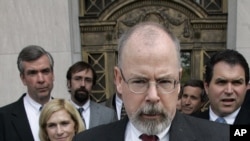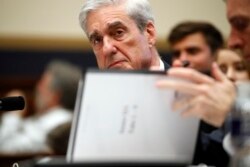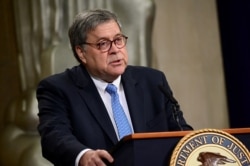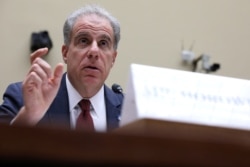The U.S. Justice department has launched a criminal investigation into the genesis of the special counsel probe of Russian interference in the 2016 U.S. presidential election, according to a person familiar with the matter.
The new investigation grew out of an internal Justice Department review of the origins of former special counsel Robert Mueller's Russia election-meddling investigation that concluded in March.
Attorney General William Barr ordered the review after taking the helm of the Justice Department in February, saying he had questions about how and why the FBI had launched the counter-intelligence investigation that also examined allegations of collusion between the 2016 campaign of President Donald Trump and Russia.
In May, Barr, who had criticized Mueller for investigative overreach before taking office, appointed veteran federal prosecutor John Durham to lead the review. Durham, the U.S. attorney for Connecticut, has previously headed federal investigations of the FBI's ties to organized crime and into the CIA's torture of terror suspects in 2005.
With the formal launch of the investigation, Durham now will be able impanel a grand jury investigative body and subpoena witnesses and documents.
The opening of the investigation suggests that Justice Department officials believe there are "facts and circumstances that reasonably indicate" a crime has occurred. It was not immediately clear who and what crime Durham will be investigating.
Barr created a stir in April when he told lawmakers he believed "spying did occur" on the Trump campaign in 2016 and disclosed that he was looking into "both the genesis and conduct of intelligence activities directed at the Trump campaign."
"I think spying on a political campaign is a big deal," Barr said, adding that while he was not suggesting that any rules were broken during the surveillance, "it's important to look at them."
The "spying" comment was hailed as a vindication by Trump, who had long accused — without offering any evidence — the administration of former President Barack Obama of spying on members of his campaign in 2016.
Although Barr has not said what he meant by spying, it was believed to be a reference to the secret surveillance of former Trump campaign adviser Carter Page in 2016 and 2017. The FBI obtained a secret surveillance warrant based in part on a largely debunked dossier prepared by a former British intelligence agent.
The use of the so-called "Steele Dossier" sparked Republican accusations of improper surveillance of the Trump campaign.
The Justice Department's inspector general, Michael Horowitz, recently completed an investigation into allegations the FBI improperly obtained the surveillance warrants. Horowitz has yet to release his findings.
Mueller wrapped his investigation in March, concluding there was not enough evidence the Trump campaign had colluded with Russia to influence the outcome of the 2016 election.
Mueller wrote that he could not exonerate Trump of allegations of obstruction of justice, however, turning the matter over to Attorney General Barr.
Barr said he could find no evidence of obstruction.
Trump has repeatedly characterized the Justice Department's initial Russia investigation as a "witch hunt."














